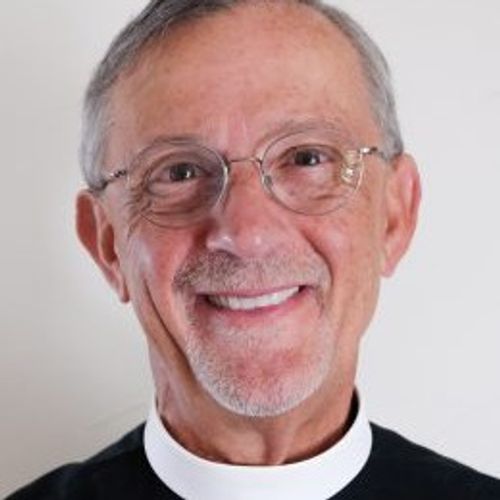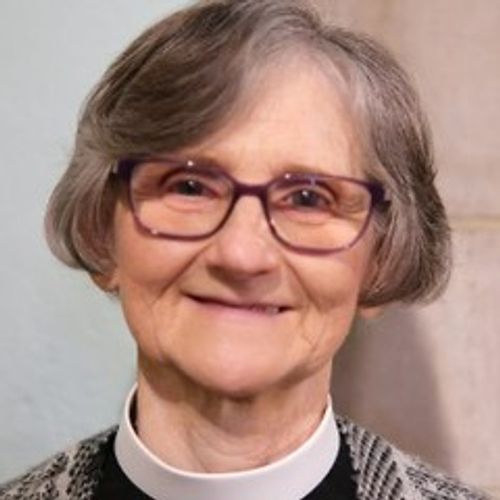The Ripple Effect of Kindness
The Ripple Effect of Kindness: Exploring the 5th Beatitude
Join the Good News team, Lynn Shematek, Lauren Welch, and Jon Shematek, as they delve into the 5th Beatitude from Matthew's Gospel: 'Blessed are the merciful, for they shall have mercy shown to them.' In this insightful conversation, they discuss the essence of mercy, sharing personal anecdotes and examples from the scriptures. They explore how small acts of kindness can create ripples of compassion, the difficulties of showing mercy to those we dislike or don't understand, and practical steps to cultivate a merciful heart. Tune in for a thought-provoking and inspirational discussion on how we can embody mercy in our daily lives.
00:00 The Ripple Effect of Kindness
00:14 Introducing the 5th Beatitude
00:29 Personal Reflections on Mercy
02:28 Challenges in Showing Mercy
03:42 Cultivating Compassion and Understanding
04:34 Jesus as the Ultimate Example of Mercy
08:06 Practical Steps to Show Mercy
10:25 Final Thoughts and Reflections
10:51 Closing Remarks and Resources
Visit us at our website at https://listeningforclues.com/
Transcript
Picture every act of kindness as a pebble dropped into a pond.
2
:The ripples spread outwards and
eventually return to where they began.
3
:In one of his beatitudes, Jesus speaks
about being merciful this way...
4
:. So let's join a conversation with
our Good News team Lynn Shematek,
5
:Lauren Welch and Jon Shematek.
6
:Lauren: Today, we're going to talk
about the 5th Beatitude in Matthew's
7
:Gospel, Blessed are the merciful, for
they shall have mercy shown to them.
8
:Jon, what's the first thing that
comes to mind when you hear merciful?
9
:Jon: the first thing that comes to
mind when I hear merciful is that
10
:maybe I've done something wrong.
11
:And maybe somebody has
been kind to me about that.
12
:Showing me mercy means they've It
might be being forgiven, but I'm also
13
:thinking that it just they are making
me feel okay about it, even though
14
:I've done something that might've
been wrong or offensive in some way.
15
:That's the first thing
that flies into my mind.
16
:Lauren: How about you, Lynn?
17
:Lynn: I often think of the, movies I
used to see in the gladiators, and they'd
18
:be, with the thumb up, and then put
the thumb down, I always thought, oh,
19
:that's an interesting way of doing it.
20
:But anyway, merciful is
something that I really work on.
21
:I like to be merciful, because I hope
people will be as merciful to me.
22
:I recognize how many of the things I do
could be taken as, irritant or, parts
23
:of speech I might use inadvertently.
24
:I hope people are merciful when they think
about what I'm saying and what I'm doing.
25
:Lauren: It sounds like it's really
important that we understand ourselves.
26
:and know how we might offend or, have
someone show us mercy, if people show
27
:us mercy, it makes us more willing,
to have mercy for other people.
28
:Jon: a lot of times when I've done a
small act of kindness like letting a car
29
:get in ahead of me or someone With their
shopping cart get into the cashier I
30
:think I'll let them in I sometimes think
31
:Maybe someone will let me in the
next time maybe someone Be kind to
32
:me because I've shown this little
act of kindness to someone else.
33
:Lauren: The disciples had a hard
time figuring out how many times
34
:they needed to be merciful, In the
Gospels, Peter asked Jesus, How many
35
:times do I have to forgive my brother?
36
:Seven times?
37
:And Jesus seems to say,
a lot more than that.
38
:And even our enemies, even people
that we really don't like, and
39
:that's when it gets harder, I think.
40
:how do we begin to have mercy towards
people who do horrendous things.
41
:But how do we begin to have mercy with
people who we just don't understand?
42
:Lynn: That's a great question.
43
:I think that's very difficult
because you're dealing with
44
:the fear of the unknown.
45
:we don't know the person, we don't
understand, this is terrible, this
46
:person's done this, and it's awful.
47
:it's very hard to get around that.
48
:You have to realize that they're all
human beings, they're all children of God.
49
:maybe they have a problem and
they just can't express it So
50
:that's a very difficult thing to
51
:Jon: Yeah, I absolutely
agree it's difficult to do.
52
:I'm wondering whether the first
step, might be having the intention.
53
:We may not always have the ability,
but having the intention to understand
54
:the other person, we can never
know how someone else is feeling.
55
:we can't say that.
56
:that's one of the most irritating
things I hear is when someone
57
:says, I know how you feel.
58
:you don't know how I feel.
59
:I don't know how you feel, but,
can I begin to imagine what
60
:that person is experiencing?
61
:if I can begin to put myself in
their shoes, not to identify them
62
:so much, but to get an inner sense
of where they are, how are they
63
:hurting, because they probably are
hurting if they're doing something.
64
:I'm thinking, you gave a great example,
Lauren, from the scriptures about how
65
:many times do we need to forgive someone.
66
:When I was thinking about, The
word mercy, after you asked me the
67
:first time, I thought about, where
do we see that in the Gospels?
68
:how many times do we hear someone
calling out to Jesus, have mercy on me.
69
:I'm blind.
70
:Have mercy on me.
71
:My daughter's dying.
72
:this desire, that the divine one
will enter that person's life and
73
:help them move toward healing.
74
:when Jesus came to, so many
circumstances of his healing ministries,
75
:he felt compassion for the person.
76
:He, which literally means he
entered into their suffering,
77
:he was suffering with them.
78
:he was perfect, he could do that.
79
:we're not quite that good.
80
:It takes practice, just like everything.
81
:if we can, begin to cultivate a feeling
of compassion a step in that direction
82
:is what you were saying, Lynn, is to
recognize that we're all children of
83
:God, and siblings together in that
situation, then maybe we'll find it
84
:possible to be a little bit compassionate,
understanding, kind, even to someone
85
:who is In our judgment, really awful
people, if they're doing bad things, I
86
:think it is possible to show them mercy.
87
:Not easy, but possible.
88
:Lauren: I agree with you, Jon.
89
:Along with what you're saying about
putting ourselves in their shoes, we
90
:can get to know them a little better
by, asking where they're hurting,
91
:What is most important to them?
92
:getting to know about their
family, their circumstances.
93
:if we start by getting to know them.
94
:then I think compassion comes a
little easier sometimes if we begin to
95
:talk about things we have in common.
96
:We may develop a relationship.
97
:In relationship, you can show mercy.
98
:We might be able to show mercy, more often
if we're in relationship with people.
99
:Jesus actually got to know
people pretty quickly.
100
:the Centurion who came to him,
he saw him for who he was It's
101
:being present to that person.
102
:That's hard when you don't like
someone . When you like someone,
103
:it's not so hard, but when you don't
like someone, it's hard to be present
104
:Jon: I've always thought of Jesus, as
having the most highly developed sense of
105
:intuition of any human being that's ever
walked on this earth he would ask people
106
:what they needed but he knew in his heart.
107
:what they needed.
108
:So I think that, he's pretty good
example for us in terms of what it,
109
:what we can do to be merciful to others.
110
:Lauren: He was merciful from the cross,
111
:Jon: Yes.
112
:Lauren: from the beginning, throughout
all of his ministry, he was merciful
113
:to people by loving them, and I think
because of his great love for the divine.
114
:And if we understand how
much the divine loves us.
115
:Then, we can extend that and know that
the divine allows other people, if we
116
:really do know that we are all children
of God, we are siblings of one another.
117
:So what can we do?
118
:How can we begin to cultivate this mercy
towards others, what are small things
119
:that we can do with someone that we
haven't seen for a while, or someone
120
:that has a need that we could fulfill?
121
:What are some small things we can do?
122
:Lynn: But one of the most important
things is contact, communication
123
:Between people.
124
:write an email or, send
a text or something.
125
:Just say, thinking of you, because
I've gotten notes like that, thinking
126
:of you and I hope you're doing well
it's really, simple but very powerful.
127
:Lauren: Anything else?
128
:Jon: I agree with what Lynn just
said, because reaching out to
129
:people, is a great first step.
130
:the other thing we could do, is when
we meet someone and ask, how are you?
131
:to look interested in
knowing the answer to that.
132
:rather than just saying, hi, how you
doing, and hoping people say fine and
133
:move on if you really look open to hear
how are they truly, just like we did a
134
:few minutes ago before we were on camera,
really seriously interested in the other.
135
:I think that's the whole
secret, of, mercy, and being
136
:merciful, is having an interest.
137
:Having, and then go beyond
interest to love eventually.
138
:But let's say having at least
an interest in the other.
139
:Someone who is not you.
140
:Someone, perhaps, who's
estranged from you.
141
:Or just someone you've
lost track of over time.
142
:So I think making contact is good.
143
:we have these opportunities in
casual encounters with people.
144
:Surprising opportunities to
really connect with them and to
145
:find out, how are they doing?
146
:how often is it that if you feel listened
to, you feel so much better, you feel like
147
:you're taking a step toward being healed?
148
:Lauren: I think listening to
other people is probably the
149
:greatest gift we can give them.
150
:We can listen them into being the
person that they are to become.
151
:deep listening is one of the things
that I think is, A gift that we all
152
:can give, and we can give it freely.
153
:Jon: I think for our viewers and
listeners, I'm wondering what
154
:you think the word mercy means.
155
:I'm wondering if you can think of times
in your own life where you have shown
156
:mercy or have mercy shown to you in
something big or something very small.
157
:And what can you do today
to show mercy to another?
158
:I want to thank everyone for being
with us in this conversation.
159
:Lynn: Take care.
160
:Lauren: Peace and blessings
161
:..............
Dolores: This episode on the Beatitudes has been brought
162
:to you by listening for clues.
163
:You can find us at our
website listeningforclues.com,
164
:on our YouTube channel or on just
about any audio podcast channel.
165
:hope to see you soon.





